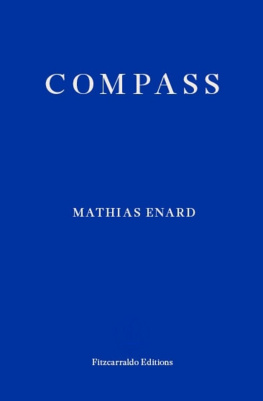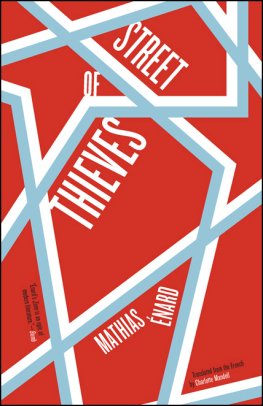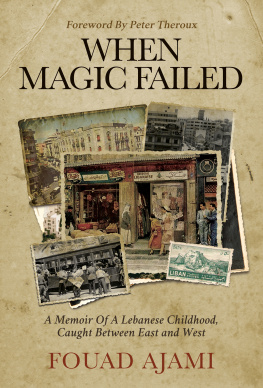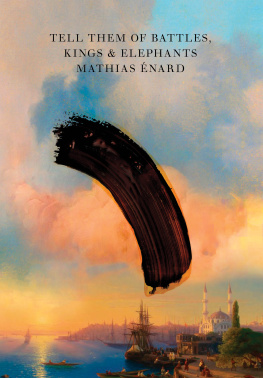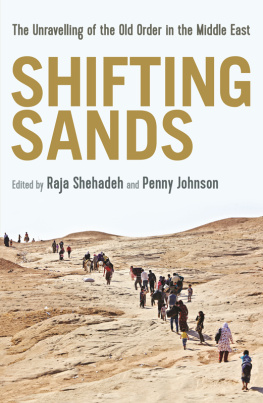Intelligent writers are fairly common. Erudite ones, somewhat less. There arent many ambitious writers, either. Im not talking about the writers who seek fame they are legion but about those who believe like Calvino that Literature can survive only by pursuing outsized goals, even those beyond all hope of achievement. Mathias Enard is all of the above.
Olivier Rolin, author of The Meteorologist
The new Balzac.
Grgoire Lemnager, LObs
One of the most interesting novelists of his generation
Raphalle Leyris, Le Monde
A text in perpetual motion, with long and beautiful spiralling sentences like the whirls of smoke from an opium pipe, Compass is a novel of escape, oscillating constantly between East and West, between Nervalian melancholy and slightly lighter tones.
Elisabeth Philippe, Les Inrockuptibles
Praise for Street of Thieves
Street of Thieves confirms Enard as the most brazenly lapel-grabbing French writer since Michel Houellebecq.
Leo Robson, New Statesman
This is what the great contemporary French novel should be. Enard looks at the world as it is: poisoned by religion, poisoned by politics, choking on materialism and dying of globalization. His prose bites, and his characters retain our sympathy however extreme their actions. Enard fuses the traditions of Cline and Camus, but he is his own man.
Patrick McGuinness, author of The Last Hundred Days
A remarkable and important novel. I cant think of any better contemporary writers than Enard.
Thom Cuell, Bookmunch
Street of Thieves is a feat of the imagination propelled by deep cultural familiarity and experience, an extraordinary animation of another person Ill read everything Enard writes from now on.
Lee Klein, 3:AM Magazine
Street of Thieves represents the kind of fiction one hopes will emerge, from Enard or others, after the tumult once known as the Arab Spring has receded a little further into the past.
Robert F. Worth, New York Times
Set against a backdrop of rising Islamic extremism, the Arab Spring, and the Occupy movement, Enards latest novel is a howling elegy for thwarted youth.
Publishers Weekly
Praise for Zone
Mathias nard has found a way to restore death to life and life to death, and so joins the first rank of novelists, the bringers of fire, who even as they cant go on, do.
Garth Risk Hallberg, The Millions
Enards novel is to be seen within a tradition of French avant-garde writing The result is a modern masterpiece.
David Collard, Times Literary Supplement
The brilliance of Zone lies in its brutal refusal to stop. Again and again, Mathias Enards white-knuckle narrative plunges us back into the battle-scarred past, forcing us to confront its horrors a relentlessly inventive novel.
David Winters, Literary Review
[T]he material of a conventional thriller has been sublimated into an atmosphere of violence, power and cruelty; humanity here is little more than a vector through which various kinds of insanity flow.
Nicholas Lezard, Guardian
The novel of the decade, if not of the century.
Christophe Claro, translator of Thomas Pynchon
Zone is a major and compelling work, a work that will keep you in its grip from its first utterance to its last.
Brian Evenson, author of Last Days
Like Flaubert and James Joyce, Enard seems to have found a model for his omnivorous novel in the Homeric epic, while Ezra Pounds ghost also haunts Zone. Enards erudite and ambitious novel is a Flaubertian encyclopaedia of our times at the end of a violent century.
Stephen Burn, New York Times
I havent read anything this worthy of publication in years, nor this stylistically and thematically interesting, this politically and literarily engaged, this exciting and gripping, this moving and heart-breaking and this the real kicker given that Zone is a 521 page stream of consciousness readable. Zone is as close to a flawless novel as I have encountered in a very, very, long time.
Scott Manley Hadley, The Triumph of the Now
Die Augen schlie ich wieder,
Noch schlgt das Herz so warm.
Wann grnt ihr Bltter am Fenster?
Wann halt ich mein Liebchen im Arm?
Once more I try to close my eyes
yet my heart beats strong and warm
when will the leaves at my window turn green,
when will I hold my darling in my arms?
Wilhelm Mller & Franz Schubert, Die Winterreise
Contents
CHAPTERS
Orientalists in Love
Caravan of Cross-Dressers
Gangrene & Tuberculosis
Portraits of Orientalists as Commanders of the Faithful
Encyclopaedia of the Decapitated
We are two opium smokers each in his own cloud, seeing nothing outside, alone, never understanding each other we smoke, faces agonizing in a mirror, we are a frozen image to which time gives the illusion of movement, a snow crystal gliding over a ball of frost, the complexity of whose intertwinings no one can see, I am that drop of water condensed on the window of my living room, a rolling liquid pearl that knows nothing of the vapour that engendered it, nor of the atoms that still compose it but that, soon, will serve other molecules, other bodies, the clouds weighing heavy over Vienna tonight: over whose nape will this water stream, against what skin, on what pavement, towards what river, and this indistinct face on the glass is mine only for an instant, one of the millions of possible configurations of illusion look, Herr Gruber is walking his dog despite the drizzle, hes wearing a green hat and his eternal raincoat; he avoids getting splashed by the cars by making ridiculous little leaps on the pavement: the mutt thinks he wants to play, so it leaps towards its master and gets a good clout the second it places its dirty paw on Herr Grubers trench coat, despite everything he manages to reach the road to cross, his silhouette is lengthened by the streetlights, a blackened pool in the midst of the sea of shadows of the tall trees ripped apart by the headlights along the Porzellangasse, and Herr Gruber seems to think twice about plunging into the Alsergrund night, as I do about leaving my contemplation of the drops of water, the thermometer, and the rhythm of the trams descending towards the Schottentor.
Existence is a painful reflection, an opium addicts dream, a poem by Rumi sung by Shahram Nazeri, the ostinato of the zarb makes the window vibrate slightly beneath my fingers like the skin of the drum, I should go on reading instead of watching Herr Gruber disappearing under the rain, instead of straining my ears to the swirling melismata of the Iranian singer, whose power and timbre could make many of our tenors blush with shame. I should pause the CD, impossible to concentrate; pointless reading this offprint for the tenth time, I dont understand any of its mysterious meaning, twenty pages, twenty horrible, frosty pages, which reached me precisely today, today when a compassionate doctor may have named my illness, declared my body officially diseased, almost relieved at having given my symptoms a diagnosis a deadly kiss a diagnosis well need to confirm while beginning a treatment, he said, and following the diseases evolution, evolution, there it is, there we are, contemplating a drop of water evolving towards disappearance before it re-forms itself in the Great All.
There is no such thing as chance, everything is connected, Sarah would say, why did I receive this article in the mail precisely today, an old-fashioned, stapled offprint instead of a PDF accompanied by a note hoping it arrives safely, an email that could have given some news, explained where she is, what this Sarawak is where shes writing from, according to my atlas its a state in Malaysia in the northwestern part of the island of Borneo, not far from Brunei and its rich sultan, not far from the gamelans of Debussy and Britten either, it seems to me but the tenor of the article is quite different; no music, aside perhaps from a long dirge; twenty dense leaves that appeared in the September issue of

